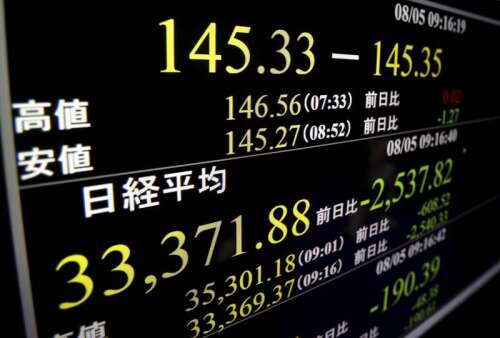A monitor shows the Nikkei 225 stock index Monday in Tokyo.
AP
U.S. stocks are set to open sharply lower Monday, adding to steep declines in Asia and Europe and deepening a sell-off tied to worries about a recession in the U.S. economy. Japan’s main index plunged more than 12%, its worst day since 1987.
S&P 500 futures are down 3.1% and Nasdaq futures are sinking 4.7%. Investors are fleeing the Big Tech names that until recently had powered the U.S. market higher: Apple fell more than 7% and Meta was down 6% in premarket trading. Chipmaker Nvidia tumbled 12.5%.
Futures for the Dow Jones Industrial Average fell 2.1%.
A report Friday showing hiring by U.S. employers slowed last month by much more than expected followed weak reports on manufacturing and construction and stoked fears the U.S. economy was finally bending under the pressure of high interest rates. Investors worldwide sold stocks and moved to the safety of bonds, pushing bond yields sharply lower.
The shake-up began just a couple of days after U.S. stock indexes had jumped to their best day in months after Federal Reserve Chair Jerome Powell set the stage for possible rate cuts to begin in September.
But after Friday’s jobs report, worries are rising the Fed may have kept its main interest rate at a two-decade high for too long, raising risks of a recession in the world’s largest economy. A rate cut would make it less expensive for U.S. households and companies to borrow money, but it could take time for the effects to boost the economy.
Until Friday, there had been relatively few huge market swings in the past year.
A bonanza around artificial intelligence technology helped drive Big Tech stocks higher, while other areas of the market held up amid rising hopes for coming cuts to interest rates by the Federal Reserve. But professional investors have been warning that shakier times may be ahead given uncertainty about how quickly the Fed will cut interest rates and other big questions.
Monday’s plunge in the Nikkei followed a nearly 6% drop on Friday. In mid-July, the index had risen to all-time highs. Its worst single-day rout was a plunge of 3,836 points, or 14.9%, on Oct. 19, 1987, a global markets crash that was dubbed “Black Monday” but proved to be only a temporary setback despite fears it might have augured a worldwide downturn.
On Monday, the Nikkei closed down 4,451.28 points at 31,458.42. It had dropped 5.8% on Friday, making this its worst two-day decline ever.
Share prices have fallen in Tokyo since the Bank of Japan raised its benchmark interest rate on Wednesday.
The Japanese yen also has fallen sharply, trading at 142.37 yen for one U.S. dollar, down from 146.45 late Friday and sharply below its level of over 160 yen a few weeks ago.
Analysts said another factor contributing to the falling share prices was carry trades, where investors borrow money from a country with low interest rates and a relatively weak currency, like Japan, and invest those funds in places that will yield a high return. Investors have been selling stocks to repay those loans as their costs have risen with a stronger yen and higher interest rates.
South Korea stocks sank almost 9%.
In Europe, markets in London, Paris and Frankfurt each dropped more than 2%.
The euro rose to $1.0951 from $1.0923.
One of the few bright spots was Kellanova, formerly Kellogg’s, which gained 22% on reports that Snickers owner Mars was deep in talks to acquire the cereal and snackmaker.
The latest setback has hit markets heavily weighted toward computer chipmakers like Samsung Electronics and other technology shares: on Monday, South Korea’s Kospi plummeted more than 9% as Samsung’s shares sank 10.3%. It closed 8.8% lower at 2,441.55.
Taiwan’s Taiex also crumbled, losing 8.4% as Taiwan Semiconductor Manufacturing Co., the world’s biggest chipmaker, dropped 9.8%.
“To put it mildly, the spike in volatility-of-volatility is a spectacle that underlines just how jittery markets have become,” Stephen Innes of SPI Asset Management said in a commentary. “The real question now looms: Can the typical market reflex to sell volatility or buy the market dip prevail over the deep-seated anxiety brought on by this sudden and sharp recession scare?”
The VIX, an index that measures how worried investors are about upcoming drops for the S&P 500, was up 105% as of early Monday. Bitcoin which recently had surged to nearly $70,000, was down nearly 17% at $52,100.00.
Oil prices slipped, with U.S. benchmark crude oil giving up $1.41 to $72.11 per barrel. Brent crude, the international standard, lost $1.35 cents to $75.46 per barrel.
Investors will be watching for data on the U.S. services sector from the U.S. Institute for Supply Management due later Monday that may help determine if the sell-offs around the world are an overreaction, Yeap Jun Rong of IG said in a report.
Even though worries over weakness in the U.S. economy and volatile markets have rippled around the world, the U.S. economy is still growing, and a recession is far from a certainty.
But the mood was decidedly dark.
Hong Kong’s Hang Seng Index lost 2.2% to 16,579.97 and the S&P/ASX 200 in Australia declined 3.7% to 7,649.60.
The Shanghai Composite index, which is somewhat insulated by capital controls from other world markets, edged higher but then gave way, losing 1.5% to 2,862.56.
The S&P 500’s 1.8% decline Friday was its first back-to-back loss of at least 1% since April. The Dow Jones Industrial Average dropped 1.5%, and the Nasdaq composite fell 2.4%, taking it to 10% below its record set last month. That level of drop is what traders call a “correction.”
